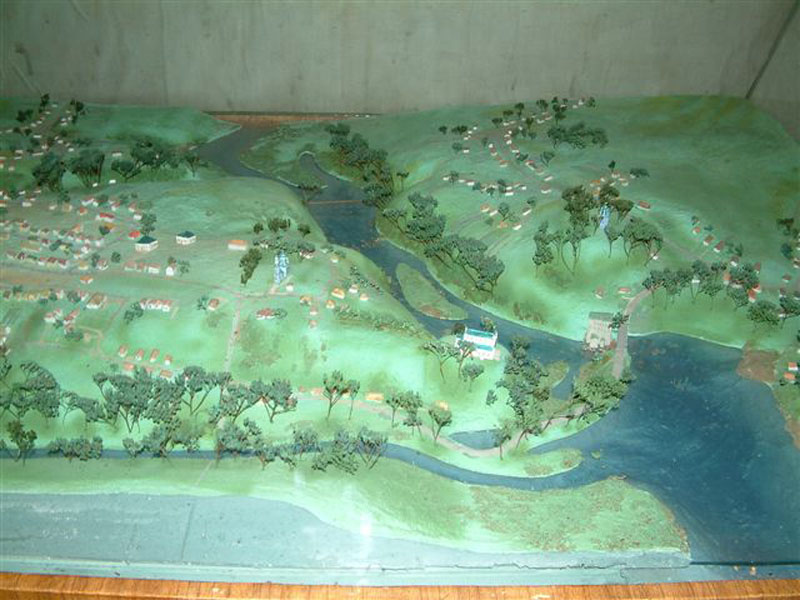
Photograph 1 of 17

She reports that only two buildings are still standing from when the Shniers lived there (Moishe Shnier was born in Pavolitch). One is the Synagogue, which is shown here.
Lisa has posted an excerpt of her book when it was tentatively entitled The Breadbasket: The Memoirs of Pearl Unikow here (Pearl Unikow is Lisa's grandmother, and
Pearl's grandfather is Beryl Shnier, Moshe Shnier's uncle) and that web site has a page about Pavolitch here.
Photograph 2 of 17

Photograph 3 of 17

Photograph 4 of 17

Photograph 5 of 17

Photograph 6 of 17

Maury Shnier (in Toronto, but born in Winnipeg in 1964) writes (January 27, 2006):
"[...] I know Nathan Jacobsen, who she credits with fixing up the Jewish cemetery there.
"He's about 10 years older than me and grew up around the corner. He's a pretty good friend of Jonathan Wolch's. Now that I think of it – he probably grew up in the same clan of River Heights Winnipeggers as Sara Wolch.
"Nathan is an apparently successful international-man-of-mystery kind of a guy [...].
"Anyway – another factoid uncovered.
"Maury
Photograph 7 of 17

Photograph 8 of 17

Photograph 9 of 17

Photograph 10 of 17

"My forefathers have lived in several countries without ever leaving their village. Pavolitch is a rural community on the Rostovitsa river in western Ukraine. It used to be in southwest Russia, and before that it was in eastern Poland, or sometimes southern Lithuania. The area was in flux throughout the centuries with armies endlessly fighting, invading, occupying and retreating. The neighbouring countries squabbled over the region like small children fighting over a new toy and so, as the centuries progressed, Pavolitch passed from one hot-headed child to another. Its name changed too, depending on the provenance of the person you spoke to. Poles and Ukrainians called it Pawolocz or Pawolotsch and Russians knew it as Pavoloch. In Yiddish it was Pavolitch and that was what we called it.
Photograph 11 of 17

"My family was never rich, but it was very distinguished. My great-grandfather, Akiva, was born in 1835 into the Agers family, which was one of the leading Jewish families in the area and commanded respect for miles around. Even though Akiva had had to change his family name to Shnier (I could never understand quite why), he retained the name of Agers for his business and so was revered by his customers. His brother Meyer, who became a wealthy merchant in the nearby town of Berdichev, kept the name of Agers. Despite his status at the forefront of the Jewish community, Akiva never learnt to read or write. His business was rye, and since the 1850s he had owned a mill in the heart of Pavolitch. All his prices and accounts were calculated using an abacus that hung on the wall of his warehouse, and beside it he would scratch into the crumbly red stone little chalk marks that were completely meaningless to anyone but himself.
Photograph 12 of 17

"My Dad and I both liked Pavolitch a lot. It's a very sleepy little place now, much smaller than it would have been 100 years ago, but is pretty, with the lake and river and the town sitting at the top of a steep incline above the lake. There are a few paved roads and some old cobbled ones, and the whole place is surrounded by fields where peasants (mostly women as far as we could see) still work with old-fashioned hand-held tools. There were lots of chickens, cows and horse-drawn carts around.
Photograph 13 of 17

"You are correct in that The Breadbasket is written from my grandmother's point of view.
"As regards the name-change from Agers to Shnier, yes, this is something my grandmother mentioned. However, we now believe the original name was actually Hager, which as you probably know, is the name of a famous Hassidic Rabbinical family from western Ukraine. We think Akiva might have been distantly related to the Hager rabbis (which is pretty prestigious!).
"Remember though, when the name was changed, it would have been the first
part of the 19th century and surnames were in their early stages and hardly
ever used. People would have been known simply as (for example) Reb Akiva or
Berl ben Akiva. Also, people changed their names for all sorts of reasons.
We know that Akiva knocked out all his teeth to avoid conscription; it is
very likely he changed his name for the same reason. We know that my
great-great-grandfather did this: Pearl's father's father's name was
Shapiro, but the family carried out a 'false adoption' which changed his
surname to Unikow so that he appeared to be an only son and would thus not
be called up into the army.
Photograph 14 of 17

Photograph 15 of 17

Photograph 16 of 17

Photograph 17 of 17
